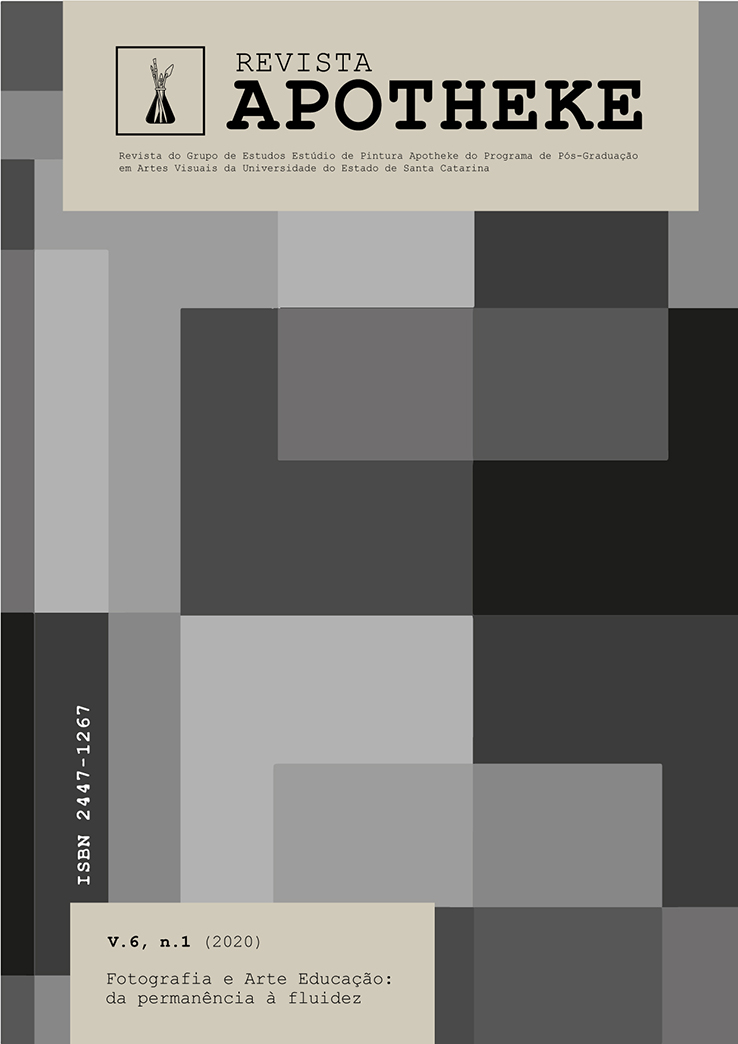O ensino e a produção da fotografia artística: o caso do curso FIC de extensão do IFPB
DOI:
https://doi.org/10.5965/24471267612020027Palavras-chave:
fotografia artística , artes visuais , curso de extensão , ensino de fotografiaResumo
O presente artigo trata do ensino e da produção da fotografia artística no estado da Paraíba. Tendo como recorte o curso FIC de extensão em fotografia artística do Instituto Federal de Educação, Ciência e Tecnologia da Paraíba – IFPB. Tal aperfeiçoamento é ofertado de forma gratuita, propiciando a acessibilidade de um público diversificado. A metodologia utilizada foi de um estudo de caso com uma pesquisa participante. O texto explana acerca do tempo atual, sem perder de vista a historicidade do ensino, aprendizagem e fluidez da arte contemporânea paraibana, com enfoque no ensino e na produção da fotografia artística.
Downloads
Referências
ARCHER, Michael. Arte Contemporânea: uma história concisa. São Paulo: Martins Fontes, 2008.
ARGAN, Giulio Carlo. Arte moderna. São Paulo: Companhia das Letras. 1992.
BARBOSA, Ana Mae (Org.). Ensino da Arte: memória e história. São Paulo: Perspectiva, 2008.
BAZIN, André. O cinema ensaios. São Paulo: Editora Brasilienese, 1991.
BOURDIEU, Pierre e BOURDIEU, Marie-Claire. O Camponês e a Fotografia. Curitiba: Revista Sociologia e Política, 2006.
BRANDÃO, Carlos Rodrigues (Org.). Pesquisa participante. São Paulo: Editora Brasiliense, 1981.
BRITES, Blanca; TESSLER, Élida. O meio como ponto zero: metodologia da pesquisa em artes visuais. Porto Alegre: Editora da UFRGS, 2002.
COTTON, Charlotte. A fotografia como arte contemporânea. Tradução Maria Silva Mourão Netto, Marcelo Brandão Cipolla. 2 ed. São Paulo: Editora WMF Martins Fontes, 2013.
GIL, Antônio Carlos. Como elaborar projetos de pesquisa. São Paulo: Atlas, 1991.
MACHADO, Arlindo. Pré-cinemas & pós-cinemas. Campinas: Papirus, 1997.
MACHADO, Arlindo. A televisão levada a sério. São Paulo: Editora Senac, 2000.
MARTINS, Raimundo; TOURINHO, Irene. Educação da Cultura Visual: conceitos e contextos. Santa Maria: Editora da UFSM, 2011.
NASCIMENTO, Erinaldo Alves do. Singularidades da educação da cultura visual nos deslocamentos das imagens e das interpretações. In: MARTINS, Raimundo; TOURINHO, Irene (Orgs.) Educação da Cultura Visual: conceitos e contextos. Santa Maria: Editora UFSM, 2011.p. 209-226.
Downloads
Publicado
Como Citar
Edição
Seção
Licença
Copyright (c) 2020 REVISTA APOTHEKE

Este trabalho está licenciado sob uma licença Creative Commons Attribution-NonCommercial 4.0 International License.
Os autores de trabalhos submetidos à Revista APOTHEKE autorizam sua publicação em meio físico e eletrônico, unicamente para fins acadêmicos, podendo ser reproduzidos desde que citada a fonte. Os mesmos, atestam sua originalidade, autoria e ineditismo.
Os artigos publicados pela revista são de uso gratuito, destinados a aplicações
acadêmicas e não comerciais. Os direitos autorais são todos cedidos à revista. Os artigos cujos autores são identificados representam a expressão do ponto de vista de seus autores e não a posição oficial da Revista Apotheke. O(s) autor(es) se compromete(m) a sempre que publicar material referente ao artigo publicado na Revista Apotheke mencionar a referida publicação da seguinte forma:
"Este artigo foi publicado originalmente pela revista Apotheke em seu volume (colocar o volume), número (colocar o número) no ano de (colocar o ano) e pode ser acessado em: http://www.revistas.udesc.br/index.php/APOTHEKE/index"
É responsabilidade dos autores a obtenção da permissão por escrito para usar em seus artigos materiais protegidos pela Lei de Direitos Autorais. A revista Apotheke não é responsável por quebras de direitos autorais feitas por seus colaboradores.
Os autores mantêm os direitos autorais e concedem à revista o direito de primeira publicação, com o trabalho licenciado sob Licença Creative Commons do tipo atribuição BY-NC:
Atribuição (BY): os licenciados têm o direito de copiar, distribuir, exibir e executar a obra e fazer trabalhos derivados dela, conquanto que deem créditos devidos ao autor ou licenciador, na maneira especificada por estes.
Uso Não comercial (NC): os licenciados podem copiar, distribuir, exibir e executar a obra e fazer trabalhos derivados dela, desde que sejam para fins não comerciais.
Após a publicação dos artigos, os autores permanecem com os direitos autorais e de republicação do texto.




